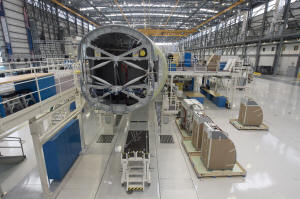Who's to blame? Jet delivery delays spark penalties battle
 Send a link to a friend
Send a link to a friend
 [January 18, 2023] By
Tim Hepher and Padraic Halpin [January 18, 2023] By
Tim Hepher and Padraic Halpin
DUBLIN (Reuters) - A battle for compensation is brewing over delays in
the delivery of commercial jets, with a Dublin aviation summit
descending into a blame game over the worst industrial disruption in
years.
Airbus and Boeing are on average delivering new jetliners three-to-six
months late, blaming post-pandemic havoc in supply chains, delegates at
two major aviation finance conferences said.
Powerful leasing companies heaped pressure on planemakers over the
delays, with Air Lease Executive Chairman Steven Udvar-Hazy telling this
week's Airline Economics conference that manufacturers had "grossly
misjudged" their output.
Airbus and Boeing defended their record, saying the situation is the
result of a mix of factors, from the pandemic to weak supply chains, and
a sudden snapback in travel demand.
The public exchanges reflect the battle lines in negotiations behind the
scenes over whether manufacturers should bear contractual responsibility
by paying penalties, even when suppliers are at fault, people involved
in the discussions said.
With January already marked by fresh delay notices being sent to
airlines and leasing companies, experts said millions of dollars of
exposure are riding on one word: "excusable".

Aircraft contracts contain dense descriptions of adverse factors which
excuse manufacturers for multiple types of delay, meaning they can avoid
paying penalties or "liquidated damages".
Excusable delays include "acts of God", natural disasters, fire, flood,
earthquakes and epidemics, among other examples, according to extracts
of past contracts filed with regulators.
They may give the manufacturer a get-out in the event of a failure to
obtain parts. Wars and strikes are also excusable.
Non-excusable delays include anything that falls outside this catalogue,
but are rare, experts say. Only the grounding of the Boeing 737 MAX over
design defects was treated as a non-excusable delay on a significant
scale, resulting in hefty compensation payments from Boeing, industry
sources said.
With last year's deliveries below target and doubts rising over 2023,
planemakers are once again invoking the "excusable delay" clause, buyers
said. Airbus and Boeing declined comment on contractual matters.
[to top of second column] |

An Airbus A321 is being assembled in the
final assembly line hangar at the Airbus U.S. Manufacturing Facility
in Mobile, Alabama September 13, 2015. REUTERS/Michael Spooneybarger/File
Photo

But three years after the early spread of COVID-19, with demand now
surging and China coming back onto the market, lessors used their
annual summit to argue enough is enough.
'OVER-OPTIMISTIC'
"They are not excusable at all," Aengus Kelly, chief executive of
lease giant AerCap told the Airfinance Journal conference when asked
about the delays.
"(Manufacturers) were just wildly over-optimistic in what they could
produce. They are trying to blame COVID but COVID has long gone."
France ended a COVID-related state of emergency last July. The World
Health Organisation said last month there were "still too many
uncertainties and gaps for us to say the pandemic is over", but
added it hoped to declare the emergency over in 2023.
Tensions have been exacerbated by the increasingly short notice for
delays, lessors said. Filling the gap may involve getting jets out
of storage, which means facing maintenance bills and bottlenecks in
repair shops.
The amount of damages at stake varies from contract to contract, but
one buyer said typical exposure in the event of inexcusable delays
could reach $20,000 a day for single-aisle jets, rising up to a
ceiling of $2 million-3 million per plane.
Even so, that may not mean a cash windfall. Jetmakers prefer to
offer credits and large buyers have the scope to renegotiate earlier
deals.
"I think it is more likely that there is some other form of
concession from the manufacturers. Whether it crosses the line of a
liquidated damages payment ... is part of an overall commercial
discussion," said Andy Cronin, chief executive of leasing company
Avolon.
"But if it persists I wouldn't rule it out," he told Reuters.
(Additional reporting by Conor Humphries. Editing by Sharon
Singleton)
[© 2023 Thomson Reuters. All rights
reserved.]
This material may not be published,
broadcast, rewritten or redistributed.
Thompson Reuters is solely responsible for this content.
 |